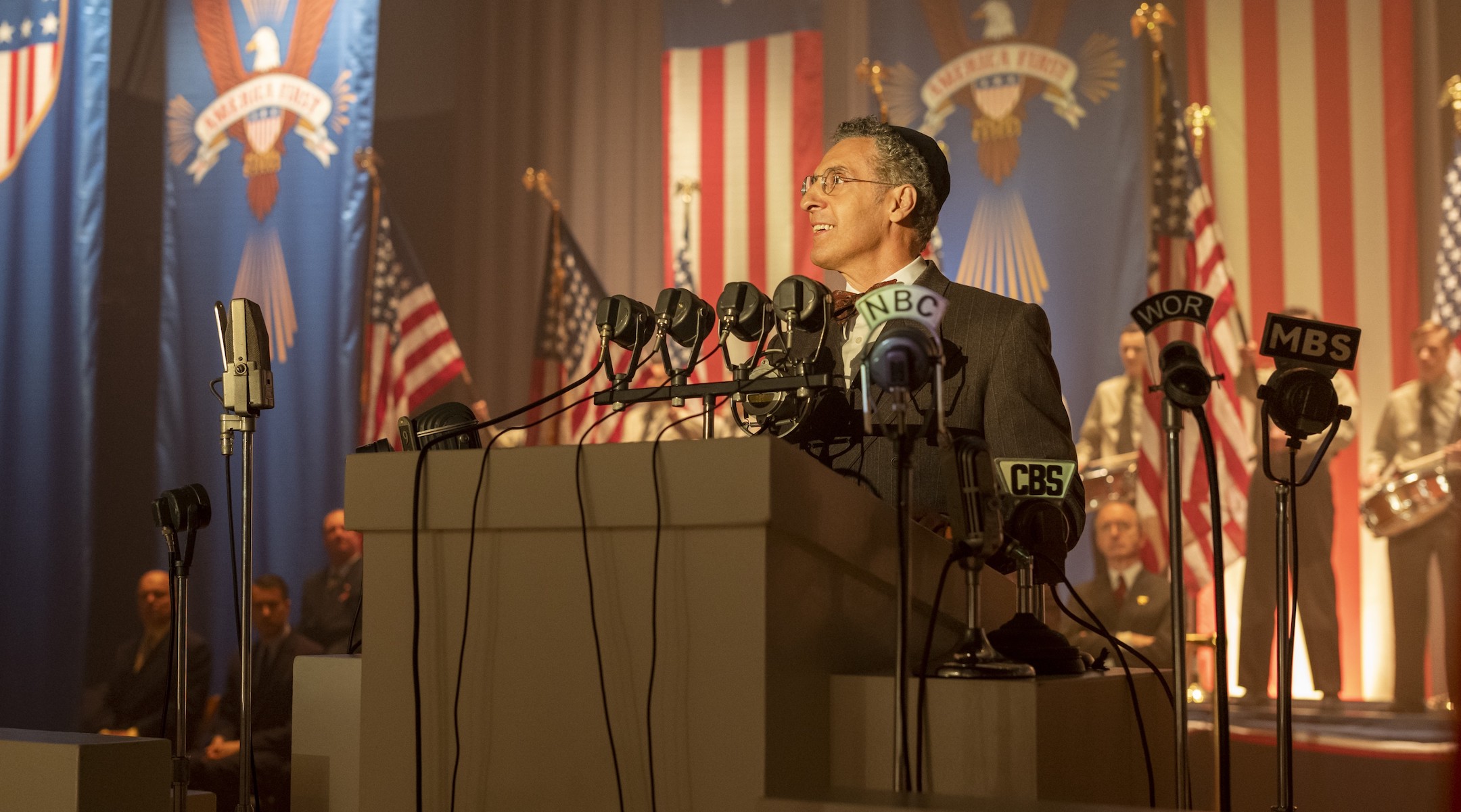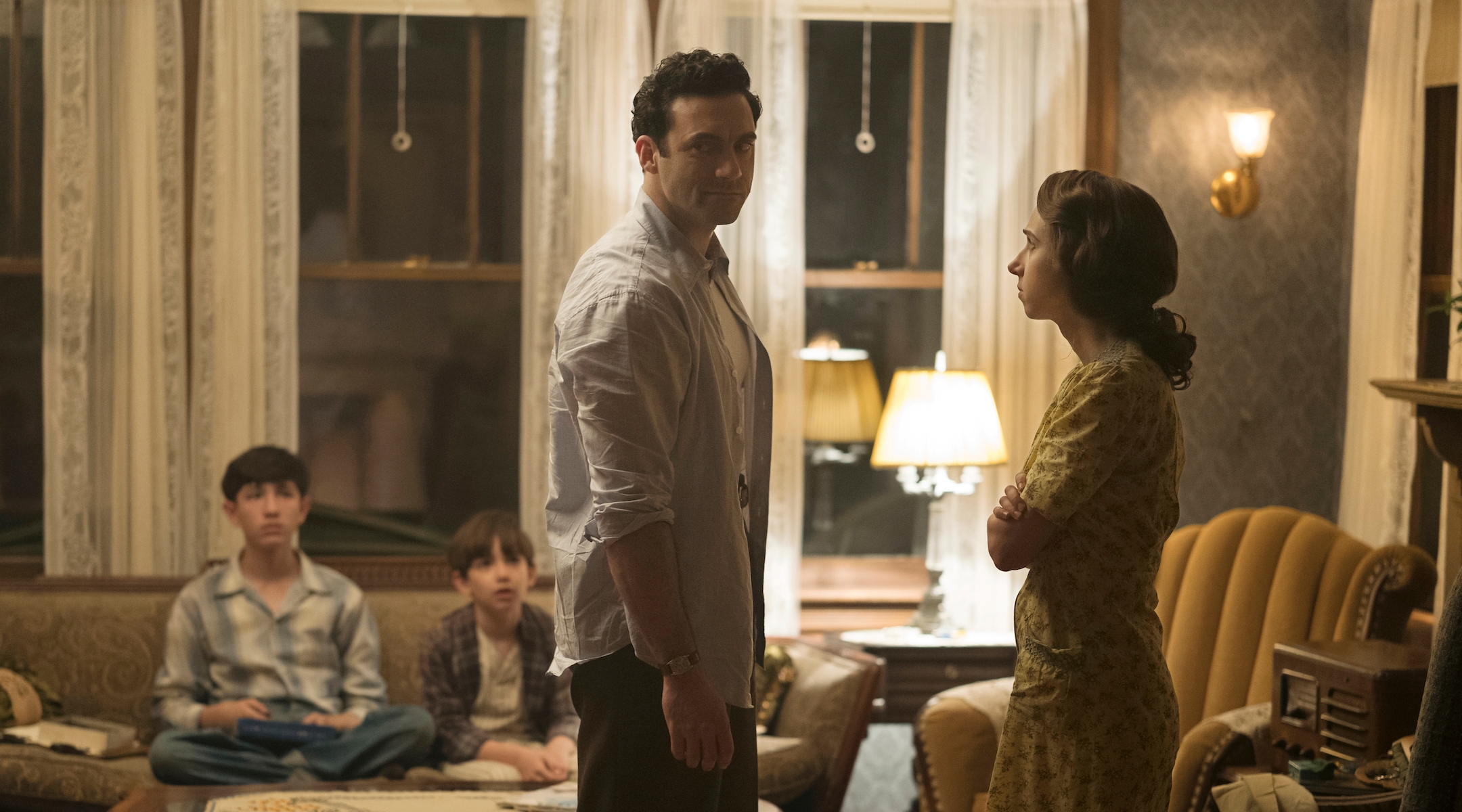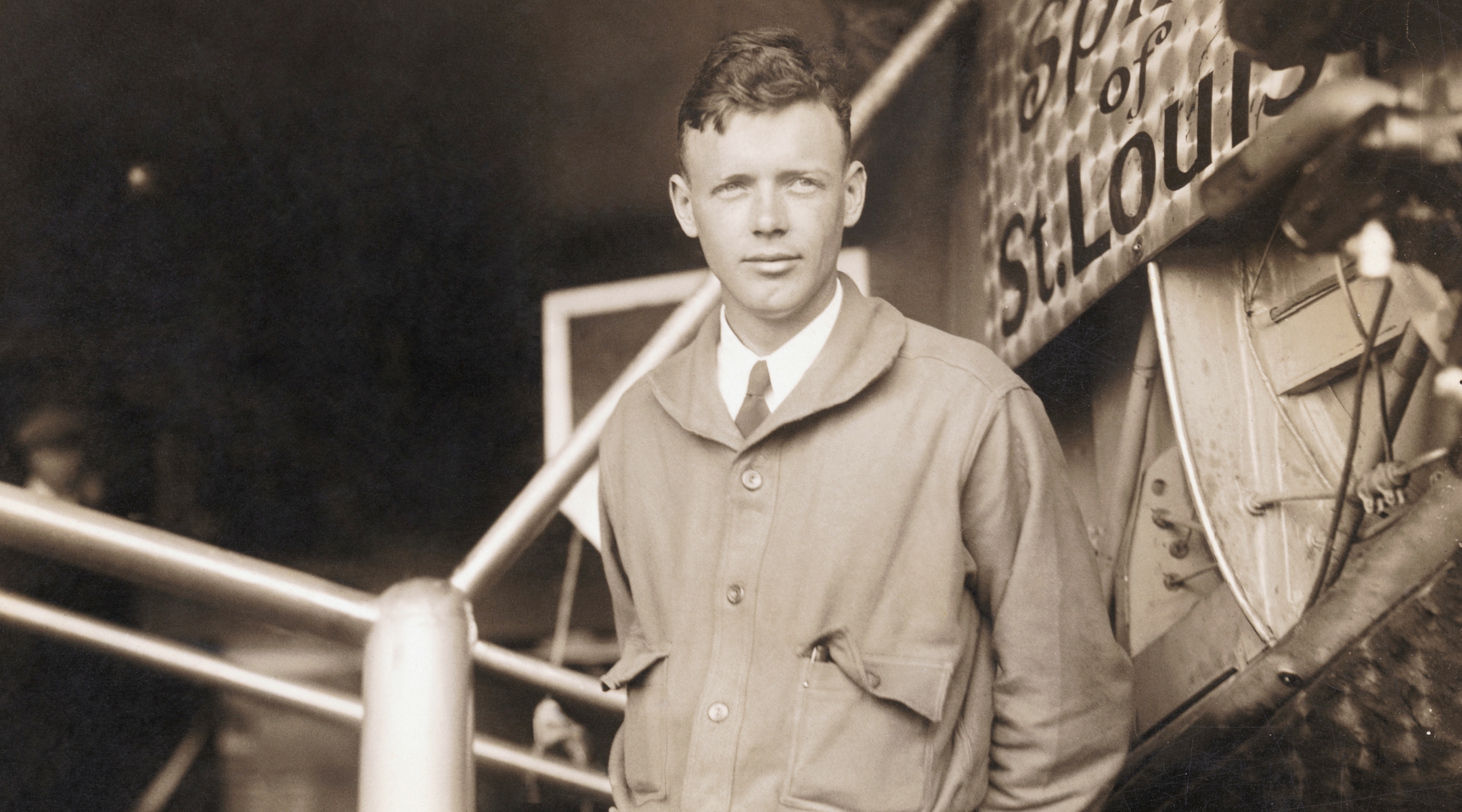(JTA) — The new TV show based on Philip Roth‘s novel “The Plot Against America,” helmed by David Simon, the Jewish creator of “The Wire,” has premiered on HBO and made a splash with critics and fans.
The eerily captivating series, which borrows details from the iconic Jewish author’s life and a crucial moment in American history, depicts an alternative reality in which isolationist Charles Lindbergh defeats Franklin D. Roosevelt in the 1940 presidential election and encourages anti-Semitic attitudes throughout the country.
The story follows the Jewish Levin family — young Philip, his brother Sandy and his parents, Bess and Herman — caught in an America that’s veering toward fascism, where anti-Semitism has become mainstream and commonplace.
While “The Plot Against America” is a work of fiction, it features many real newsreels from the period and involves several true stories. Let’s separate fact from fiction and explore the real historical figures and events behind “The Plot Against America,” with some help from the JTA archive.
Who was Charles Lindbergh?
He was a decorated U.S. aviator, writer, activist and, sadly, anti-Semite.
In 1927, the 25-year-old Air Mail pilot from Detroit rose to fame, literally, when he flew the first nonstop solo trans-Atlantic flight. Lindbergh was trying to win the Orteig Prize, which was being offered by the American hotelier Raymond Ortieg to whoever could complete the first nonstop flight from New York to Paris. The award came with $25,000 — the equivalent to about $370,000 today.
“Lucky Lindy,” as he was nicknamed, became an American icon following the flight and crowds greeted him wherever he went. His autobiographical tale about his flight, “WE,” became a bestseller and President Calvin Coolidge awarded him the Distinguished Flying Cross medal. A statue of his likeness was erected in Maryland — ironically by a Jewish sculptor, Louis Rosenthal.
The tragic kidnapping of Lindbergh’s 20-month-old baby in 1932 became a huge story. Lindbergh paid the ransom, but his son was found dead two months after the abduction.
Lindbergh used his fame to become an activist and promote the field of aviation around the world. But he also became a leader of the America First movement.
As Uriel Heilman wrote for the Jewish Telegraphic Agency in 2016: “Created in 1940 after Hitler already had invaded Poland, the America First Committee argued that the U.S. should take a neutral approach toward Nazi Germany, and even do business with it, because the Nazi regime did not threaten America directly.”
Donald Trump was criticized for his frequent use of the phrase “America first” during his presidential campaign.
Was Lindbergh anti-Semitic?
Lindbergh’s words, both in speeches and in his letters and journals, suggest that he was both a white supremacist and an anti-Semite.
In 1939, he wrote in Reader’s Digest: “We can have peace and security only so long as we band together to preserve that most priceless possession, our inheritance of European blood, only so long as we guard ourselves against attack by foreign armies and dilution by foreign races.”

John Turturro plays a rabbi and supporter of Charles Lindbergh in “The Plot Against America.” (Michele K. Short/HBO)
Lindbergh, the son of Scandinavian immigrants, was a believer in eugenics. He also believed that Germany had a “Jewish problem,” and that the influence of Jews in society should be limited.
He was close friends with Henry Ford, another known anti-Semite.
Did Lindbergh really give that rousing anti-Semitic speech?
In the first episode of “The Plot Against America,” Herman Levin hears a Lindbergh speech on the radio full of anti-Semitism.
The “greatest danger to this country lies in their [the Jews’] large ownership and influence in our motion pictures, our press, our radio and our government,” Lindbergh said, among other things.
Infuriated, Herman calls over his wife, Bess, and says “He’s calling us war agitators.”
The answer is yes: The excerpts played in the show come from a real speech that Lindbergh delivered in Des Moines, Iowa, on Sept. 11, 1941.
But while in “The Plot Against America” the public embraces Lindbergh’s speech, in reality his words were met with an outcry from across the country. As JTA reported, veterans, religious leaders and editorials in newspapers across the country denounced the speech.
“The voice is Lindbergh’s but the words are the words of Hitler,” one major newspaper wrote.
Did Lindbergh really run for president?
No, he did not — but that idea is not simply a product of Roth’s imagination. In 2000, when Roth was reading an autobiography of the historian Arthur Schlesinger Jr., the famed Jewish author “came upon a sentence in which Schlesinger notes that there were some Republican isolationists who wanted to run Lindbergh for president in 1940,” Roth told The New York Times.
“That’s all there was, that one sentence with its reference to Lindbergh and to a fact about him I’d not known,” Roth said, “It made me think, ‘What if they had?’”
Is the poll about the attitude toward Jews quoted in “The Plot Against America” real?
At another point in the first episode, a Jewish newsreel projector tells Herman about a 1939 poll in which “Only thirty-nine percent of the respondents agreed that Jews should be treated like everyone else. Fifty-three percent believed that ‘Jews are different and should be restricted.’ And ten percent believed that Jews should be deported.”
Sadly, that was a real Roper Poll from that year.
Was Lindbergh really a friend of Hitler’s?
No, but he did receive a medal from the Fuehrer. In 1938, Lindbergh was awarded the Service Cross of the German Eagle by Hermann Goering on behalf of Adolf Hitler.
Lindbergh also had contacts in the Nazi Foreign Ministry.

Morgan Spector, center, as Herman Levin, and Zoe Kazan, right, as Bess Levin, in “The Plot Against America.” (Michele K. Short/HBO)
As JTA reported in 1962, “in a communication marked ‘most urgent and top secret,'” the Nazis told the German Foreign Ministry and the German chief of general staff that “Lindbergh represents the best of the Americans, who are most important for us now and in the future. The contacts with him are maintained through a group in the general staff which has the greatest importance as a counterweight against Jews and warmongers.”
What really happened in the 1940 presidential election?
Roosevelt easily defeated the Republican Wendell Wilkie, a dark-horse candidate and former Democrat, to capture an unprecedented third term. The popular incumbent picked up 55% of the popular vote and won in the Electoral College by a wide margin.
Did Philip Roth really grow up in a suburb of New Jersey?
Yes, Roth grew up in the Weequahic neighborhood of Newark, just like the Levins in the TV series.
His dad’s name also was Herman, his mother, Elizabeth, also went by the moniker Bess, and his older brother, Sanford, went by the nickname Sandy. And just a reminder, the littlest Levin in the show is named Philip. Roth was born in 1933 — that would have made him 7 years old during the 1940 election.
Just like Sandy in the book and series, Roth’s real brother was a gifted artist. And just like the TV father, Roth’s real dad was an insurance salesman.
Was anti-Semitism really a part of Roth’s childhood?
“Even before I started school,” Roth told The New York Times the year “The Plot Against America” came out, “I already knew something about Nazi anti-Semitism and about the American anti-Semitism that was being stoked, one way or another, by eminent figures like Henry Ford and Charles Lindbergh, who, in those years, along with movie stars like Chaplin and Valentino, were among the most famous international celebrities of the century.”
JTA has documented Jewish history in real-time for over a century. Keep our journalism strong by joining us in supporting independent, award-winning reporting.






